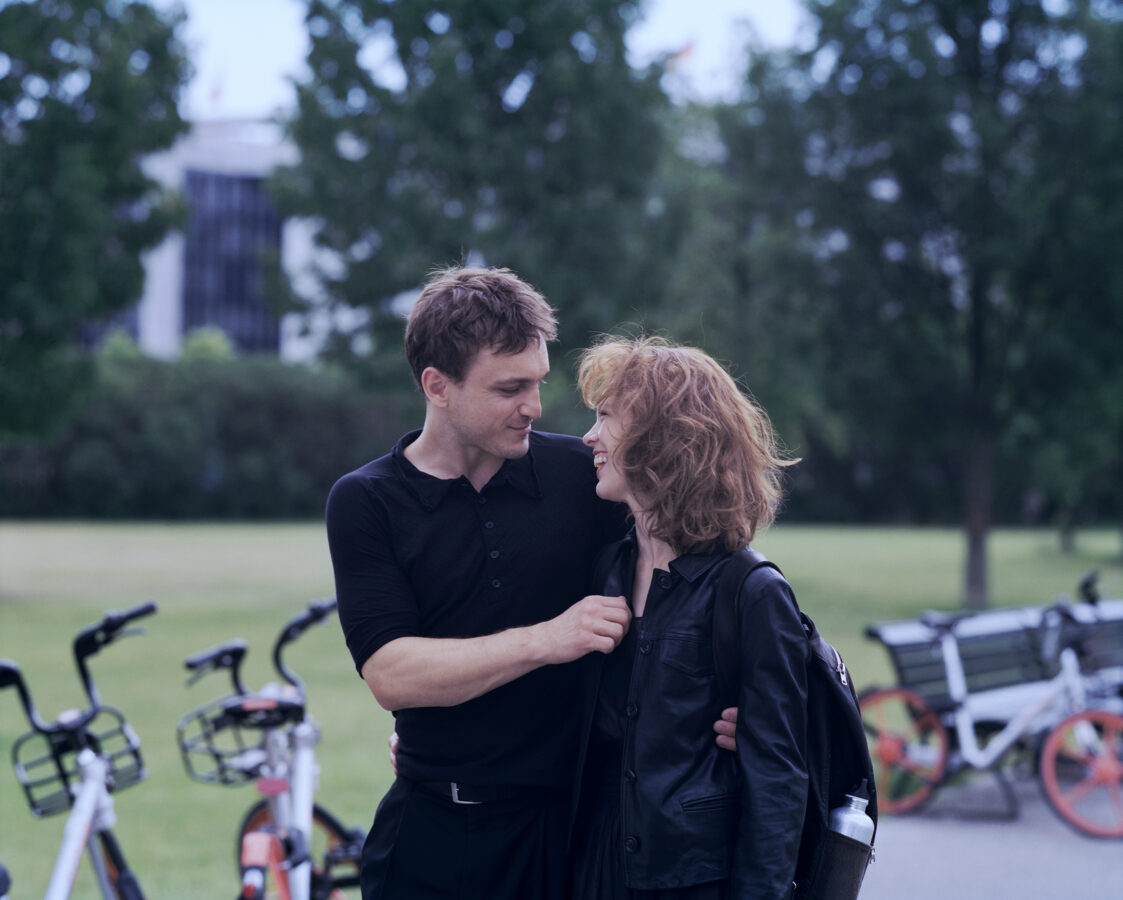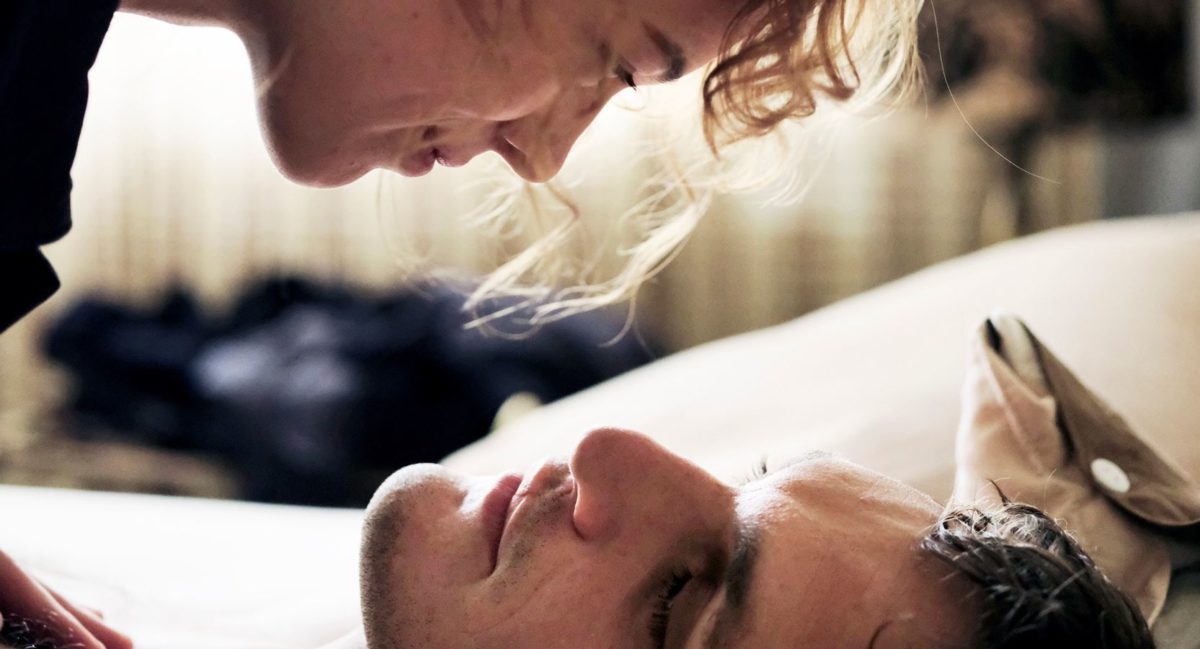Few filmmakers enliven conversation more than Christian Petzold, whose approach to any question—be it transposing narrative and philosophical tenets between national myth and contemporary film or his love for a certain Gerard Butler actioner—is attentive to the point of ravenous.
So as much as I enjoyed his latest work, Undine—which reunites him with Paula Beer and Franz Rogowski from Transit, a film that year by year further reveals itself as one of last decade’s finest—it was difficult to prioritize any one topic. Petzold is the rare arthouse figurehead who seems to live in the real world with real people; while the interview contained the hows and whys of his latest achievement, it shakes out, to use his own description of Undine, more liquid than solid, liable to take any direction the topic does (or doesn’t) suggest. Along our way “the cock of Donald Sutherland” is mentioned within stone’s throw of describing a plan-séquence.
The Film Stage: So we have a (passing) professional association: I work for Grasshopper Film, to whom you provided that list with Den of Thieves on it.
Christian Petzold: Oh? Yeah? That’s you! Den of Thieves—I love this movie, really. Everybody thought it was a joke but I love that movie; it’s great. I saw it again a year ago. I bought the Blu-ray and it was not a mistake.
There’s some need to apologize because I think I made you answer “why do you like Den of Thieves” 30 times over. But my co-worker and I ended up watching it because we were, like many people, shocked at its inclusion. And we liked it, so you were right.
For example, an actor like James Caan. When he’s making a movie with Michael Mann, Thief, you can see that this guy can work with tools; he has a skill, he has a body. I saw also in this movie, Den of Thieves. I need that a little bit. Also a movie like Good Time, by the Safdie brothers, you can see something which is lost a little bit in contemporary cinema. But this was not your question.
No, no, it’s fine.
But we can talk about cinema. I haven’t been in the cinema since one year. I have a big desire to sit in a big, big cinema room with many, many people and look at a movie that I don’t know so much about.
Are cinemas open in Germany?
No. I think in two or three weeks it’s possible, but they tried to open, now, the open-air cinemas. For me, I must say, open-air cinemas—you know this? Where you sit outside, like in a drive-in cinema without cars. These are really, really lonely places because all people who are going into the summer cinemas are groups. They take a bottle of wine and something to eat, and sit there as a group, like a picnic, in front of the screen. You can’t go into the cinema as a lonely person, alone, because you are surrounded by groups. This I hate. For me, cinema is, all people are lonely. Everybody’s by himself. I hate these groups. It’s not summertime at a lake beach or something like that. I don’t like that. These are the only cinemas open now. So it’s a problem.

I wish I could’ve seen Undine in theaters, as I’ve seen all your recent films. Fortunately I still liked it quite a bit. And as I was trying to key into what gives Christian Petzold movies their vitality I got to thinking of the fluidity among images—for instance the museum / diorama sequence, which has an amazing flow just shot-to-shot-to-shot—so I have to ask if you use a single camera or work multiple units simultaneously. There are so many set-ups per scene, which I think lends that dynamism.
We have done it with one camera. We have made a rehearsal just with her alone, with Paula, without extras. Because I want to have the situation of Paula in front of the extras later, I sit there with the DoP and we build up a plan-séquence. So the camera was on a dolly, yeah? And we are going through… we make one plan-séquence, I think, 14 minutes, and we do it two times—from another angle, so we just have these two takes. One from one angle, one from the other, and I can do the editing with these two takes. I can do it, I can see it because of all the rehearsals before.
It’s always like this: when we have rehearsals, sometimes it’s for more than five or six hours. The teams are waiting outside and it’s just the actors and me, sometimes the DoP with us, and the producer wants to commit suicide because nobody is shooting. It’s 2 p.m. or so. But then it goes very fast because we know what we have to do. I think, perhaps, it’s better to have more days like Visconti or so, but we can do it, also, a little bit like Visconti. When we have the rehearsals we can find the dynamic in the movement of the camera. The other thing is: actors have to do it from ten angles. Four, five times, they are already dead. For me, Undine is from the water, so we have to swim through the movie. She has to swim and to dive, and also the camera had to swim and to dive. The film has to have a liquid mood; that was the idea.
The location work here, e.g. the home with a pool, is absolutely fantastic. I rarely hear directors discuss this aspect, so could you elaborate on it? How much is it in the hands of a location scout? How much are you doing this yourself?
When I was very young, a student at the film academy—when I wrote scripts—I have pictures in my mind for the shooting locations. For example, an apartment with three windows, two trees in front of the window, 19th-century-style—a location scout had to find this, but this is a mistake. So I haven’t got any images in my mind during writing. I have some, but I write them down and just talk to the location scout and said, “Looking for a house with a swimming pool on the outskirts of Berlin. Very modern. New money.” Yeah? He is bringing me some photos and I go to this place. Then I start to think about my script again, after seeing the location. The script is coming after the lines; I changed my book when I found a location that I liked.
The thing is, all locations had to be very close to each other, so we can use our bicycles. It’s not something ecological, nothing to do with our ecological politics. I want all the actors and stuff to have a basis, for a very long time—three, four, five weeks. Changing hotels, changing living places, they call it in Germany “la petite mort.” A small death. Actors are very anxious. They need a place where they can stay, a place they can call home, so places like this—the swimming pool scene, the lake, the museum—you can reach by bicycle by no more than five miles. So we have a studio of our own, I must say. I like this; I need this.

You’re planning a film with, your term, “X-rated scenes.” But I found an interview conducted for Undine‘s premiere, early last year, where you said “I don’t like sex scenes. I can’t recall any good sex scenes in film.” So what will you bring to this part of, let’s say, film language that’s unique and different? Multiple set-ups? A plan-séquence of sex?
I don’t know of any sex scene that would have contributed to the development of the story. When I made my first movie for cinema, there’s a scene where a 15-year-old daughter hears her parents behind the door making sex with each other. To create the sounds of the sex of the parents make us more ashamed than if we have filmed naked bodies. The actors have to drink two bottles of red wine to create the sound of love, because to lie in front of the camera with naked bodies is not so hard. But to lie with your voice, everybody can hear this.
In the movie I will make next year, also with Paula, there are sex scenes, also, you can just hear—they are in the next room. The one who’s hearing them is jealous. But we have to create the sounds, and the actors said to me after reading the script, “This could be hard, to make this.”
There is the scene in this fantastic Venice movie, Don’t Look Now by Nicolas Roeg. This is a fantastic scene, but this scene is not about sex; it’s about a pair who lost their child. They remember their love which created the child. They remember the last time in their life. In the same moment they are together, in the same moment they are separated for all times. This is the idea of the scene—not to see naked bodies and the breasts or the cock of Donald Sutherland. This is not the idea. In the movies, always the same the last ten years: the man is on his back and the woman is over him. Always, yeah? It’s an idea of… so they can talk with each other! I can’t see this talking dialogue in sex scenes anymore, I must say.
I’ve seen this Arthur Penn movie on German television three weeks ago, Bonnie and Clyde. At the beginning you can see Faye Dunaway alone, in a hot room, in her bed. She feels fantastic. She’s alone, her whole body is filled up with desire, yeah? How this is filmed, you can’t see her breasts, you can’t see her thighs. So the whole atmosphere is wet and hot in afternoon. It’s a bored life; she wants to go out. This is something I like very much, to film like this.
I’m excited to see you do something wet and hot.
Where are you? Which town are you in now, at this moment?
Brooklyn, New York.
The door behind you looks like a German door. But… it’s a cupboard.
No, it’s a little closet door.
We have the same in Berlin.
Oh, yeah? That’s great!
I thought you were in Berlin or so. But Brooklyn, Berlin—it’s not far away.
Undine opens in select theaters and VOD on Friday, June 4.
